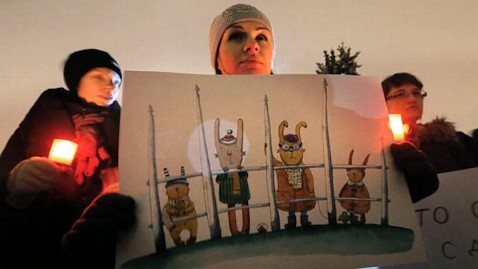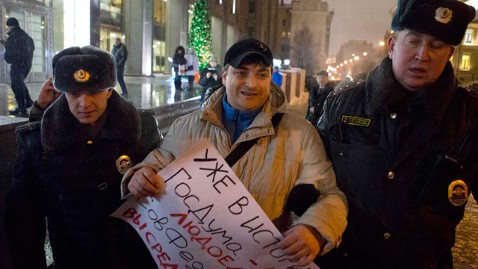
Activists protest against a bill banning U.S. adoptions of Russian children in St.Petersburg, Russia, Dec. 26, 2012. Dmitry Lovetsky/AP Photo
MOSCOW – Russian President Vladimir Putin has said he will sign a controversial ban on adoptions to the United States, defying domestic and international criticism that the move is playing politics with the lives of orphans.
The ban was added last week to a broader bill retaliating for a set of human rights sanctions that President Obama signed into law earlier this month. Putin also pledged to improve the lives of children in Russia’s notoriously under-resourced orphanages.
“I intend to sign the law you have just mentioned as well as a presidential decree changing the procedure of helping orphaned children, children left without parental care, and especially children who are in a disadvantageous situation due to their health problems,” Putin said, according to the Russian Interfax news agency, when asked about the ban during a meeting of the Russian State Council on Thursday.
Putin added that higher living standards overseas are no reason to allow children to be adopted by foreigners.
The Life of Putin
“There is one more reason of which I haven’t spoken yet, but which I would mention now. Probably there are quite a lot of places in the world where living standards are somewhat better than we have. And so what? Will we send all our children there? Perhaps we will move there ourselves?” he said.
Putin did not say when he would sign the bill into law, but if it is done immediately it would go into force on January 1.
At stake are the cases of 46 Russian children whose adoptions would be frozen if the bill becomes law, according to Russia’s children’s rights commissioner Pavel Astakhav. He said those children would receive priority to be adopted by Russian families.
American families who were preparing to welcome their newly adopted children home are instead bracing themselves for the possibility of never seeing them again.
“It’s a heartbreaking process because we’ve already started preparing our home. Not remodeling, or painting, or buying furniture or anything, but just preparing the emotional state of our home, of ourselves and of our children for the change that is going to occur,” Patrick Griffin told ABC affiliate KCUA. He and his wife Jan are just two months into adopting a child from Russia.
“You hope that it is not a door shut but just, you know, that it is simply an obstacle, a delay. But we do not know. It’s the fear of the unknown,” Griffin said.
The proposed ban has split Russian society. At least seven people were detained while protesting the bill on Wednesday as the upper house of parliament vote to approve the measure, according to RIA Novosti. Human rights advocates have urged Russian authorities not to move forward with the ban, saying it denies Russian orphans a home with a family.
It has also caused a rare division among the Russian government.
Several top officials, including Russia’s foreign minister and education minister have come out against the ban. A leaked memo from another top official suggested its passage would cause Russia to breach several international treaties, including a recently enacted adoption agreement between the United States and Russia.
Others, like Astakhav, have supported the measure, saying that Russian children should remain in Russia.
A recent poll by the Public Opinion Foundation found a majority of Russians supported the ban, while a quarter opposed it and another quarter expressed no opinion.
Russia is the third most-popular place for Americans to adopt children. According to the State Department, over 45,000 Russian children have been adopted by American families since 1999.
Russian officials, however, have pointed to the cases of 19 Russian adopted children who have been killed in the United States as evidence of broader mistreatment of Russian children by their adopted parents. The adoption ban bill was named after Dima Yakovlev, who died in 2008 after his adoptive father left him in a car in a Virginia suburb of Washington, D.C. The bill also slaps sanctions on Americans accused of abusing Russian children and judges deemed to have provided them with lenient sentences.













